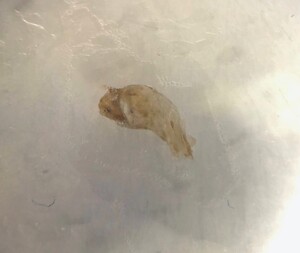Introduction
Delusions of parasitosis (DOP) is diagnosed as a delusional disorder, somatic type, if symptoms persist for more than 1 month.1 The malady is characterized by an unshakable belief that tiny, almost invisible insects or mites are living on or in the body.2,3 No argument or scientific evidence can convince a patient with true DOP that there is no infestation. The disorder is most frequently seen in middle-aged, socially isolated women (average age 57),4,5 although younger people may be affected if the cause of their delusion is drug abuse. DOP may severely affect human health because people do all sorts of things to rid themselves of the bugs, such as quitting jobs, burning furniture, abandoning homes, and using powerful pesticides dangerously. In one case report, the patient found what she called “bugs” in her stools and sputum, and claimed they changed the taste of her blood.6 Another man piled all his household furniture in the backyard and burned it. His comment at that time was “the house is next if this doesn’t get 'em.”7 A consistent feature of DOP is the patient’s absolute conviction that he or she knows exactly what the problem is. Also, the patient may be angry that their physician cannot even see, much less eliminate, their bugs. In a few extreme cases, DOP patients have become so distraught that they committed suicide or attempted to murder their healthcare provider.8,9 Interestingly, sometimes the patient may be so convincing that others in the family secondarily share in the delusion—a folie a deux.
Physicians may encounter DOP patients who bring Ziploc bags, small bottles, tape, or pieces of folded paper with them, containing specks of dusts, hair, lint, or skin which they claim contain bugs (Figure 1). In response, doctors usually examine these patients for actual arthropod infestations, evaluate them for organic causes of the crawling sensations, and sometimes prescribe medicated creams or lotions. However, the patient often becomes discouraged with that particular doctor for not helping them and soon moves on to another. Such wandering among physicians, entomologists, and public health personnel may last for years without the patient ever receiving the help he or she really needs.
Possible Causes
First of all, it must be emphasized that sometimes there is an actual arthropod involved which needs to be found and removed/treated. One sample of what a patient called “skin scratchings” consisted of blood and pieces of skin. Careful examination by an entomologist revealed tiny first-stage ticks7 (Figure 2). On the other hand, sometimes samples have all the appearances of an insect, mite, or parasite, but are only artifacts (Figure 3). Regardless, if a physician makes the diagnosis of DOP, then it’s important to realize that people with this condition don’t all arrive at it the same way. Various events, such as sudden family bereavement, flooding, or exposure to parasitized persons or animals can be precipitating factors.5,10 Also, abuse of drugs such as methamphetamine, phencyclidine (PCP), and cocaine can cause DOP,3,4,11 as well as certain prescription drugs.12 Sometimes a previous real insect infestation in the home environment triggered the delusion. For example, if someone with an indoor pet gets fleas inside the home, he or she may still feel mysterious biting long after the fleas are gone. The recent advent of bed bug infestations has exacerbated the DOP problem, both by people actually having bed bugs, or those being obsessively fearful they will get them.13,14
Diagnosis and Treatment
Dermatologists are perhaps the best medical specialty to evaluate persons with mysterious bites or itches. Skin scrapings by a dermatologist may be needed to rule out scabies mites. Samples submitted by the patient should be carefully examined for the presence of biting insects or mites. Sometimes medical lab personnel can accomplish this, although a local university entomology department or Extension Service may be better. Ideally, the patient’s home should be inspected for biting arthropods. Pest controllers will perform this service for a fee. Health department or university personnel sometimes become involved in home visits, but are under no mandate to investigate private pest problems. There may be underlying medical causes of the crawling sensation. Diabetes, pellagra, jaundice, atopic dermatitis, and lymphoblastomas produce skin manifestations that mistakenly can be considered arthropod-induced.15,16
An interdisciplinary approach is needed to help DOP patients, mainly involving dermatologists, family practice physicians, psychiatrists, and entomologists.17 Physicians should be careful not to diagnose “insect bites” based on lesions alone (patients can excoriate their skin), and should avoid any type of affirmation of the patient’s delusions by giving the impression that the delusion is real.18 In addition, physicians should call upon entomologists or public health laboratories to examine patient samples. Entomologists need to understand the medical complexity of delusions and avoid any hint of medical evaluation of the patient. As for treatment, second generation antipsychotic drugs such as risperidone or olanzapine have been successfully used for DOP,4,18,19 although the most difficult part of treatment is convincing the patient of the absence of parasites and obtaining their agreement to see a psychiatrist.6






